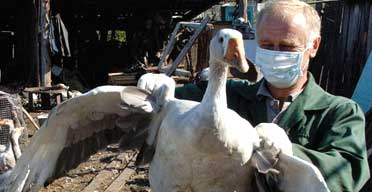
Birdwatchers will be enlisted to provide an early warning system amid increasing fears that avian flu will reach Britain, it emerged today.
The Department for Environment, Food and Rural Affairs is meeting the Royal Society for the Protection of Birds and the British Trust for Ornithology following the spread of bird flu from Asia to western Russia, a Defra spokesman said. "We are meeting with the organisations to see how we can work more closely on surveillance and get advice on the migratory patterns of wild birds."
The department's plan emerged as senior EU vets warned there was "serious concern" that an outbreak of bird flu in Russia could spread to Europe. The EU called on member states to increase surveillance.
Asked whether British ornithologists will be relied upon to be the eyes and ears for Defra against bird flu, the spokesman said: "Absolutely".
The government wants birdwatchers to be particularly vigilant for "die outs" - the death of groups of migratory birds for unexplained reasons.
Scientists are also involved in examining bird droppings for signs of the influenza A virus, which has led to the death of millions of birds and around 60 people in Asia.
The EU's executive commission tonight promised additional funding to track any possible spread of the disease, and called a special meeting to co-ordinate surveillance efforts in a few weeks.
"We clearly want to do our utmost to prevent the spread of this devastating epidemic to the EU," the health commissioner, Markos Kyprianou said.
"We will continue to monitor the situation closely to ensure that the most appropriate risk-reducing measures are in place."
In a statement, EU experts said the outbreaks in five regions of Siberia and one district in the Ural Mountains was "cause for serious concern".
However, they argued against increasing immediate measures. The EU has already banned imports of Russian poultry, and said requests for farmers across the EU to bring chickens indoors - as the Netherlands has already done - were premature.
The experts "considered a general ban on keeping poultry outdoors to be a disproportionate measure at this time," the statement said.
Migratory wild birds have been blamed for spreading the H5N1 flu strain in Russia, and officials there have warned the birds could carry the virus to Europe and North America next spring.
However, some EU experts said the risk of migratory birds bringinf avian influenza into the EU was "probably remote or low".
Other influenza experts have said it was inevitable that the virus would arrive in Europe, but that it is likely to be quickly detected and stamped out.
The H5N1 bird flu strain has killed almost 60 people in Asia, but it does not spread easily among humans - a situation experts fear could change if the virus mutates, leading to a dangerous pandemic.
The president of the British Veterinary Association, Dr Bob McCracken, today said the flu would "undoubtedly" spread to the British fowl population because of migrating birds over which there is no control.
"I don't think we should be bringing birds indoors, but we must ensure we have a sensitive surveillance alarm system so we detect it at the outset," he told BBC Radio 4's Today programme.
Scientists believe the key to stopping a devastating outbreak is catching the virus before it has time to spread to native birds or poultry.
There are fears bird flu could mutate into a form which could be contracted by humans, leading to a possible flu pandemic similar to the one which killed 40 million people around the world in 1918.
"This is a very, very serious issue," Professor Hugh Pennington, a retired University of Aberdeen microbiologist, said.
"This is a very nasty virus. It's doing enormous damage in the Far East at the moment, and it's got into Russia. If it got here, it would be economically disastrous, never mind the human impact, so we do need to be spending more than we have been spending."
He said he had heard some senior public health figures saying "this is the one thing that really keeps them awake at night".
"I don't know if we should be scared, but I think we should be putting pressure on for the resources to be made available to do the things that we know are at least going to make the problem less if it arrives," Professor Pennington said.
"This virus that we're talking about now could be even nastier than that of 1918."
The environment and farming minister, Ben Bradshaw, last week insisted the risk of bird flu reaching Britain remained low.

